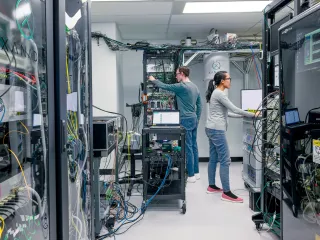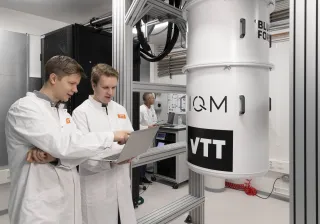VTT has started a project to manufacture superconducting photon detectors which are one of the key components required to build Xanadu’s fault-tolerant universal quantum computers.
Cooperation in a nutshell
- VTT will leverage its expertise in quantum and superconducting technologies to manufacture photon number resolving detectors for Xanadu’s quantum computers.
- The goals of this strategic partnership are to achieve scale manufacturing of Xanadu’s technology and support its mission to build quantum computers that are useful and available to people everywhere.
Headquartered in Toronto, Xanadu is a five-year-old company that has raised USD 145 million to date and counts over 100 employees. They were the first company to deploy a photonic quantum computer on the cloud, making them an industry pioneer.
Xanadu’s goal is to build a fault-tolerant universal quantum computer with a million qubits. While Xanadu doesn’t shy away from setting ambitious goals, reaching them also requires finding the right partners to work with.
“We needed a partner who could help us transition our solutions from research to manufacturing scale production – and there aren't many organizations able to do that,” Dr. Matt Collins, Low Temperature Lead from Xanadu explains.
The right expertise for a unique project
VTT’s first project with Xanadu focuses on manufacturing several key components at volume, including superconducting photon detectors. These detectors precisely count the number of photons present in each output of Xanadu’s photonics chips. This is a crucial step in generating the types of qubits needed for photonic fault-tolerant universal quantum computers.
In Xanadu’s project, it has also been crucial to understand both the research and business dimensions.
To meet the goals set over the next few years, tens of thousands of ultra-sensitive photon detectors will be required, which are currently fabricated in very small quantities. In the long run, there may be a need in the millions.
Dr. Joonas Govenius, leader of the Quantum hardware team at VTT mentions that the project presented a challenging task and unique requirements:
“It has been very satisfying to work on the project because it allowed us to bring together the expertise of several research teams at VTT in a new application. In Xanadu’s project, it has also been crucial to understand both the research and business dimensions,” Dr. Govenius explains.
Common goals and complementary expertise
Xanadu needs to efficiently scale its technology to reach fault-tolerance. VTT supports its partner to achieve this challenging milestone by providing a high level of research expertise and production capabilities. For instance, Micronova research facility plays an important role in providing fabrication capacity that is crucial for scale-up.
From the beginning, VTT has been an extremely professional and enjoyable partner to work with - wonderful, technologically excellent, and highly motivated for the right reasons.
“We knew that VTT had expertise in superconducting technologies as well as sufficient manufacturing capacity, so we were confident they would be a great partner. From the beginning, VTT has been an extremely professional and enjoyable partner to work with - wonderful, technologically excellent, and highly motivated for the right reasons.” Dr. Collins says.
Mutual trust leads to additional projects
The project is still ongoing, but Dr. Collins says it has already brought tremendous value to Xanadu. The work has progressed as planned, and the first batch of detectors will be ready for testing in early 2022. Positive experiences have already resulted in mutual trust, and several additional projects have already been agreed upon.
“Working with Xanadu has been refreshing, and I see a lot of potential for the cooperation to grow,” says Dr. Govenius.
In addition to research know-how, Xanadu has been impressed by VTT’s agility and quick turnaround times – both with contracts and with project work:
“Teams at VTT and Xanadu have been working closely, and things have been moving very quickly so far. Thanks to the time difference between Canada and Finland, I often find that someone has answered my questions before I even wake up. I have been very impressed that such a large company has been so responsive,” Dr. Collins says



